Knowledge Management Practices at Toyota
VerifiedAdded on 2023/04/23
|8
|1729
|358
AI Summary
This article discusses the knowledge management practices at Toyota and how it has helped them gain a competitive advantage. It also talks about the role of organizational culture and Japanese culture in determining the KM practices. The article compares Toyota with Honda and discusses the advantages and disadvantages of knowledge management practices. The article is relevant for students studying management and knowledge management.
Contribute Materials
Your contribution can guide someone’s learning journey. Share your
documents today.
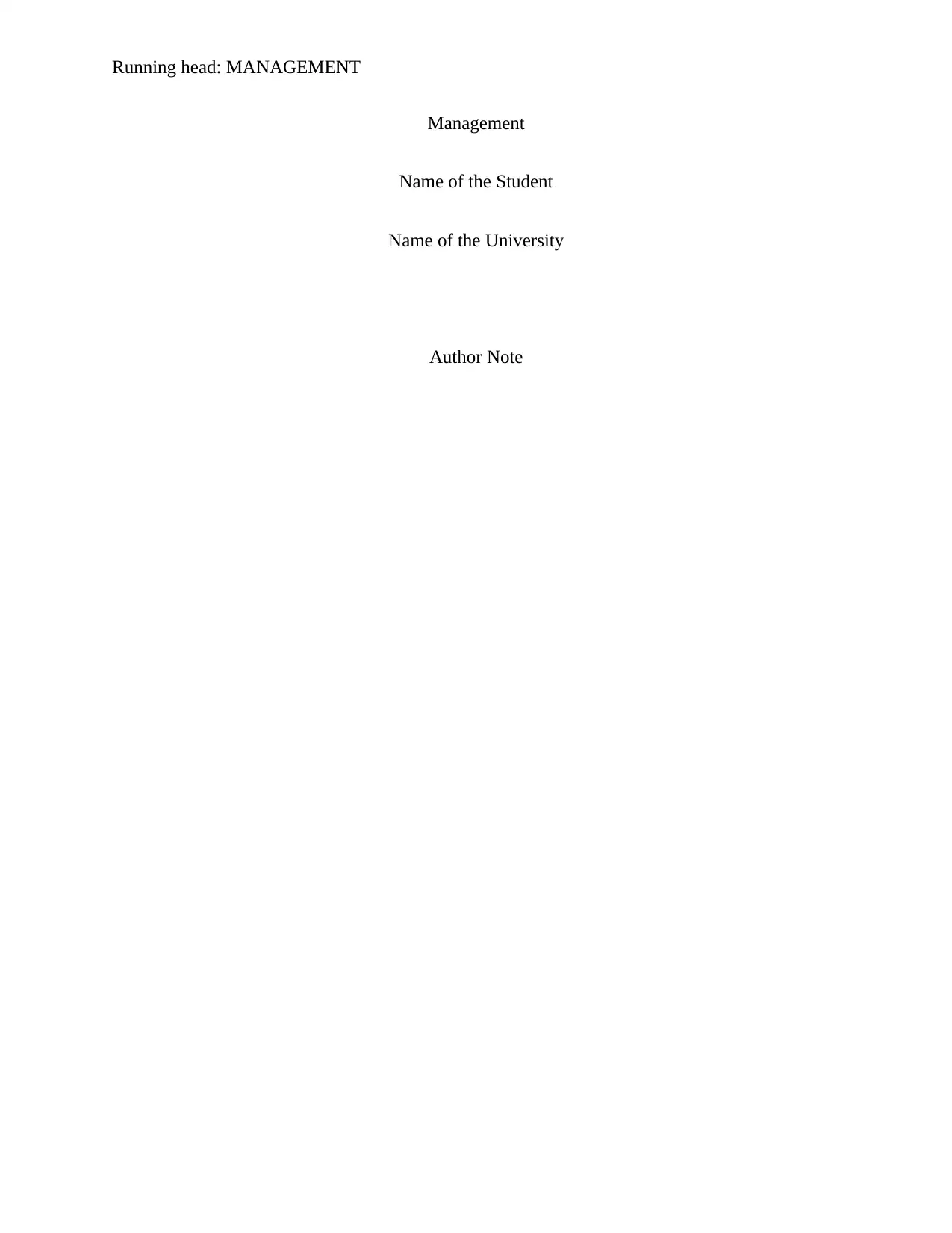
Running head: MANAGEMENT
Management
Name of the Student
Name of the University
Author Note
Management
Name of the Student
Name of the University
Author Note
Secure Best Marks with AI Grader
Need help grading? Try our AI Grader for instant feedback on your assignments.
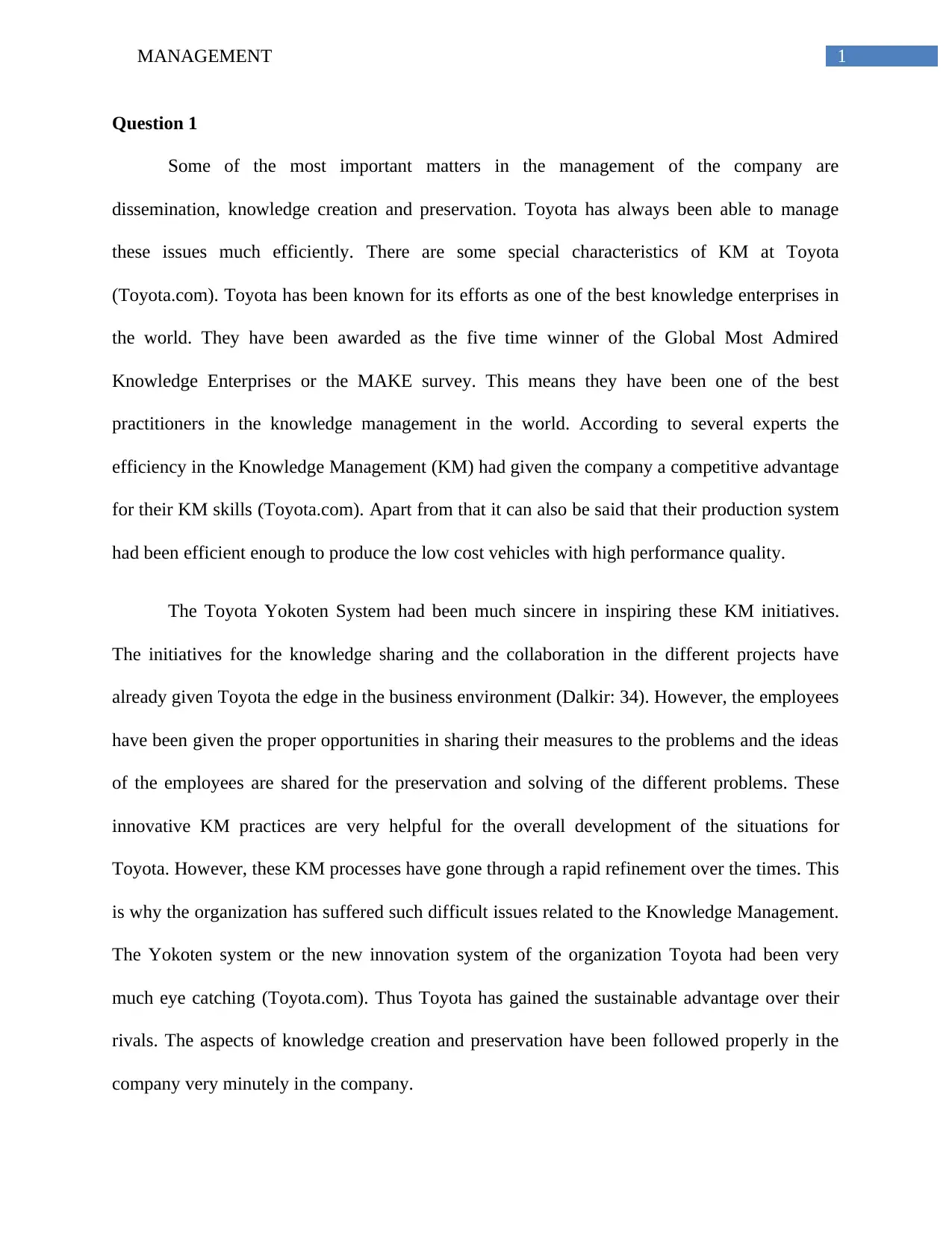
1MANAGEMENT
Question 1
Some of the most important matters in the management of the company are
dissemination, knowledge creation and preservation. Toyota has always been able to manage
these issues much efficiently. There are some special characteristics of KM at Toyota
(Toyota.com). Toyota has been known for its efforts as one of the best knowledge enterprises in
the world. They have been awarded as the five time winner of the Global Most Admired
Knowledge Enterprises or the MAKE survey. This means they have been one of the best
practitioners in the knowledge management in the world. According to several experts the
efficiency in the Knowledge Management (KM) had given the company a competitive advantage
for their KM skills (Toyota.com). Apart from that it can also be said that their production system
had been efficient enough to produce the low cost vehicles with high performance quality.
The Toyota Yokoten System had been much sincere in inspiring these KM initiatives.
The initiatives for the knowledge sharing and the collaboration in the different projects have
already given Toyota the edge in the business environment (Dalkir: 34). However, the employees
have been given the proper opportunities in sharing their measures to the problems and the ideas
of the employees are shared for the preservation and solving of the different problems. These
innovative KM practices are very helpful for the overall development of the situations for
Toyota. However, these KM processes have gone through a rapid refinement over the times. This
is why the organization has suffered such difficult issues related to the Knowledge Management.
The Yokoten system or the new innovation system of the organization Toyota had been very
much eye catching (Toyota.com). Thus Toyota has gained the sustainable advantage over their
rivals. The aspects of knowledge creation and preservation have been followed properly in the
company very minutely in the company.
Question 1
Some of the most important matters in the management of the company are
dissemination, knowledge creation and preservation. Toyota has always been able to manage
these issues much efficiently. There are some special characteristics of KM at Toyota
(Toyota.com). Toyota has been known for its efforts as one of the best knowledge enterprises in
the world. They have been awarded as the five time winner of the Global Most Admired
Knowledge Enterprises or the MAKE survey. This means they have been one of the best
practitioners in the knowledge management in the world. According to several experts the
efficiency in the Knowledge Management (KM) had given the company a competitive advantage
for their KM skills (Toyota.com). Apart from that it can also be said that their production system
had been efficient enough to produce the low cost vehicles with high performance quality.
The Toyota Yokoten System had been much sincere in inspiring these KM initiatives.
The initiatives for the knowledge sharing and the collaboration in the different projects have
already given Toyota the edge in the business environment (Dalkir: 34). However, the employees
have been given the proper opportunities in sharing their measures to the problems and the ideas
of the employees are shared for the preservation and solving of the different problems. These
innovative KM practices are very helpful for the overall development of the situations for
Toyota. However, these KM processes have gone through a rapid refinement over the times. This
is why the organization has suffered such difficult issues related to the Knowledge Management.
The Yokoten system or the new innovation system of the organization Toyota had been very
much eye catching (Toyota.com). Thus Toyota has gained the sustainable advantage over their
rivals. The aspects of knowledge creation and preservation have been followed properly in the
company very minutely in the company.
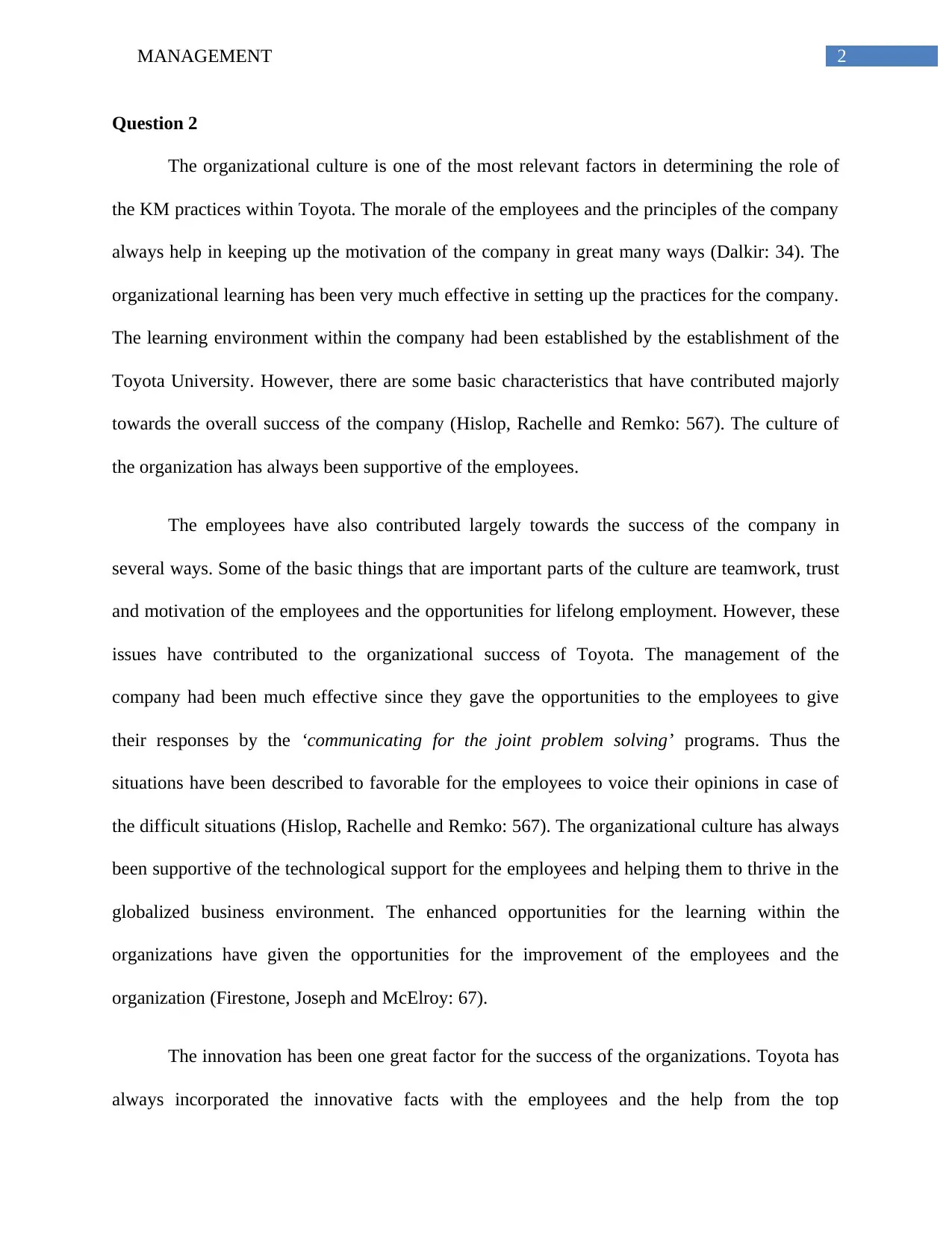
2MANAGEMENT
Question 2
The organizational culture is one of the most relevant factors in determining the role of
the KM practices within Toyota. The morale of the employees and the principles of the company
always help in keeping up the motivation of the company in great many ways (Dalkir: 34). The
organizational learning has been very much effective in setting up the practices for the company.
The learning environment within the company had been established by the establishment of the
Toyota University. However, there are some basic characteristics that have contributed majorly
towards the overall success of the company (Hislop, Rachelle and Remko: 567). The culture of
the organization has always been supportive of the employees.
The employees have also contributed largely towards the success of the company in
several ways. Some of the basic things that are important parts of the culture are teamwork, trust
and motivation of the employees and the opportunities for lifelong employment. However, these
issues have contributed to the organizational success of Toyota. The management of the
company had been much effective since they gave the opportunities to the employees to give
their responses by the ‘communicating for the joint problem solving’ programs. Thus the
situations have been described to favorable for the employees to voice their opinions in case of
the difficult situations (Hislop, Rachelle and Remko: 567). The organizational culture has always
been supportive of the technological support for the employees and helping them to thrive in the
globalized business environment. The enhanced opportunities for the learning within the
organizations have given the opportunities for the improvement of the employees and the
organization (Firestone, Joseph and McElroy: 67).
The innovation has been one great factor for the success of the organizations. Toyota has
always incorporated the innovative facts with the employees and the help from the top
Question 2
The organizational culture is one of the most relevant factors in determining the role of
the KM practices within Toyota. The morale of the employees and the principles of the company
always help in keeping up the motivation of the company in great many ways (Dalkir: 34). The
organizational learning has been very much effective in setting up the practices for the company.
The learning environment within the company had been established by the establishment of the
Toyota University. However, there are some basic characteristics that have contributed majorly
towards the overall success of the company (Hislop, Rachelle and Remko: 567). The culture of
the organization has always been supportive of the employees.
The employees have also contributed largely towards the success of the company in
several ways. Some of the basic things that are important parts of the culture are teamwork, trust
and motivation of the employees and the opportunities for lifelong employment. However, these
issues have contributed to the organizational success of Toyota. The management of the
company had been much effective since they gave the opportunities to the employees to give
their responses by the ‘communicating for the joint problem solving’ programs. Thus the
situations have been described to favorable for the employees to voice their opinions in case of
the difficult situations (Hislop, Rachelle and Remko: 567). The organizational culture has always
been supportive of the technological support for the employees and helping them to thrive in the
globalized business environment. The enhanced opportunities for the learning within the
organizations have given the opportunities for the improvement of the employees and the
organization (Firestone, Joseph and McElroy: 67).
The innovation has been one great factor for the success of the organizations. Toyota has
always incorporated the innovative facts with the employees and the help from the top
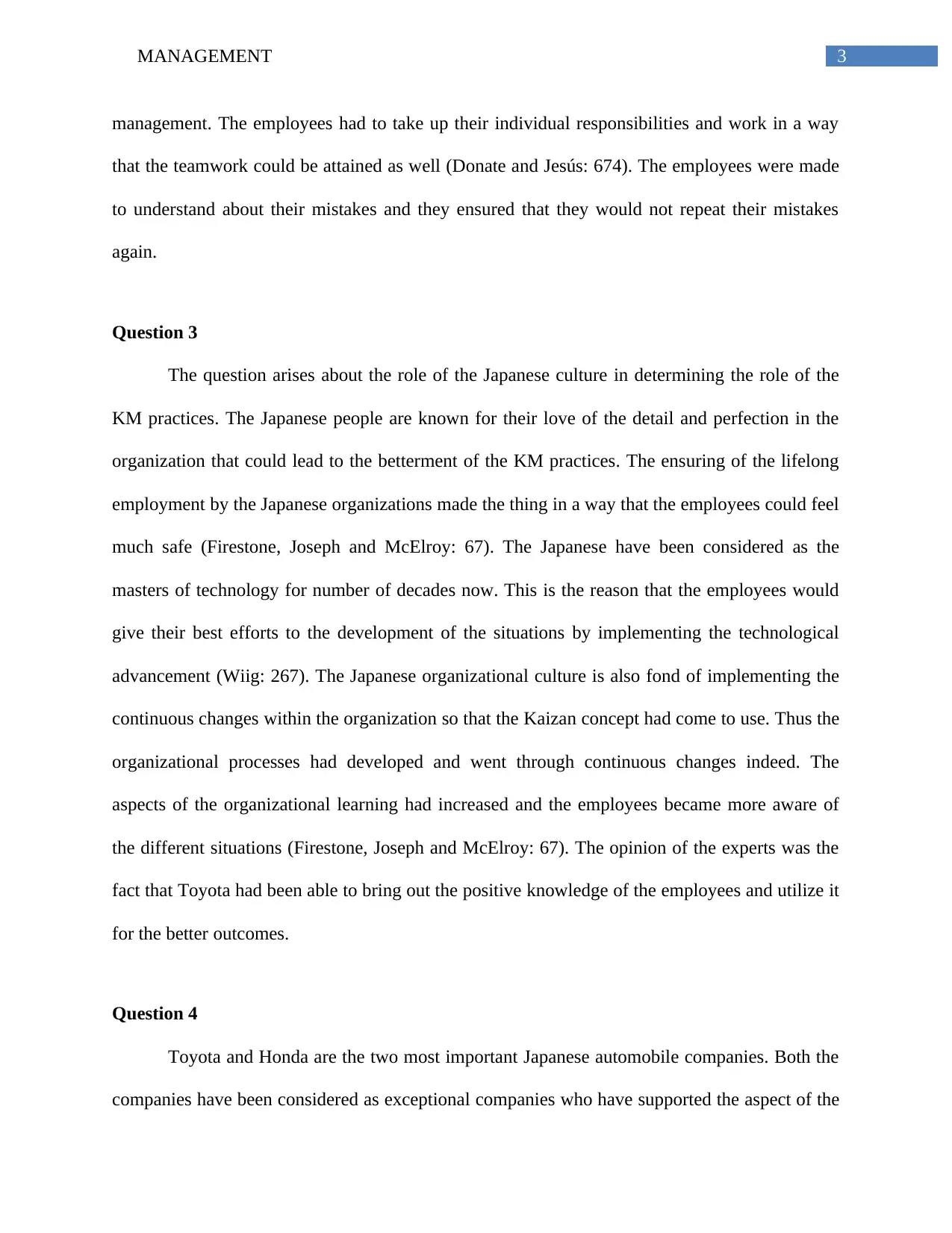
3MANAGEMENT
management. The employees had to take up their individual responsibilities and work in a way
that the teamwork could be attained as well (Donate and Jesús: 674). The employees were made
to understand about their mistakes and they ensured that they would not repeat their mistakes
again.
Question 3
The question arises about the role of the Japanese culture in determining the role of the
KM practices. The Japanese people are known for their love of the detail and perfection in the
organization that could lead to the betterment of the KM practices. The ensuring of the lifelong
employment by the Japanese organizations made the thing in a way that the employees could feel
much safe (Firestone, Joseph and McElroy: 67). The Japanese have been considered as the
masters of technology for number of decades now. This is the reason that the employees would
give their best efforts to the development of the situations by implementing the technological
advancement (Wiig: 267). The Japanese organizational culture is also fond of implementing the
continuous changes within the organization so that the Kaizan concept had come to use. Thus the
organizational processes had developed and went through continuous changes indeed. The
aspects of the organizational learning had increased and the employees became more aware of
the different situations (Firestone, Joseph and McElroy: 67). The opinion of the experts was the
fact that Toyota had been able to bring out the positive knowledge of the employees and utilize it
for the better outcomes.
Question 4
Toyota and Honda are the two most important Japanese automobile companies. Both the
companies have been considered as exceptional companies who have supported the aspect of the
management. The employees had to take up their individual responsibilities and work in a way
that the teamwork could be attained as well (Donate and Jesús: 674). The employees were made
to understand about their mistakes and they ensured that they would not repeat their mistakes
again.
Question 3
The question arises about the role of the Japanese culture in determining the role of the
KM practices. The Japanese people are known for their love of the detail and perfection in the
organization that could lead to the betterment of the KM practices. The ensuring of the lifelong
employment by the Japanese organizations made the thing in a way that the employees could feel
much safe (Firestone, Joseph and McElroy: 67). The Japanese have been considered as the
masters of technology for number of decades now. This is the reason that the employees would
give their best efforts to the development of the situations by implementing the technological
advancement (Wiig: 267). The Japanese organizational culture is also fond of implementing the
continuous changes within the organization so that the Kaizan concept had come to use. Thus the
organizational processes had developed and went through continuous changes indeed. The
aspects of the organizational learning had increased and the employees became more aware of
the different situations (Firestone, Joseph and McElroy: 67). The opinion of the experts was the
fact that Toyota had been able to bring out the positive knowledge of the employees and utilize it
for the better outcomes.
Question 4
Toyota and Honda are the two most important Japanese automobile companies. Both the
companies have been considered as exceptional companies who have supported the aspect of the
Secure Best Marks with AI Grader
Need help grading? Try our AI Grader for instant feedback on your assignments.
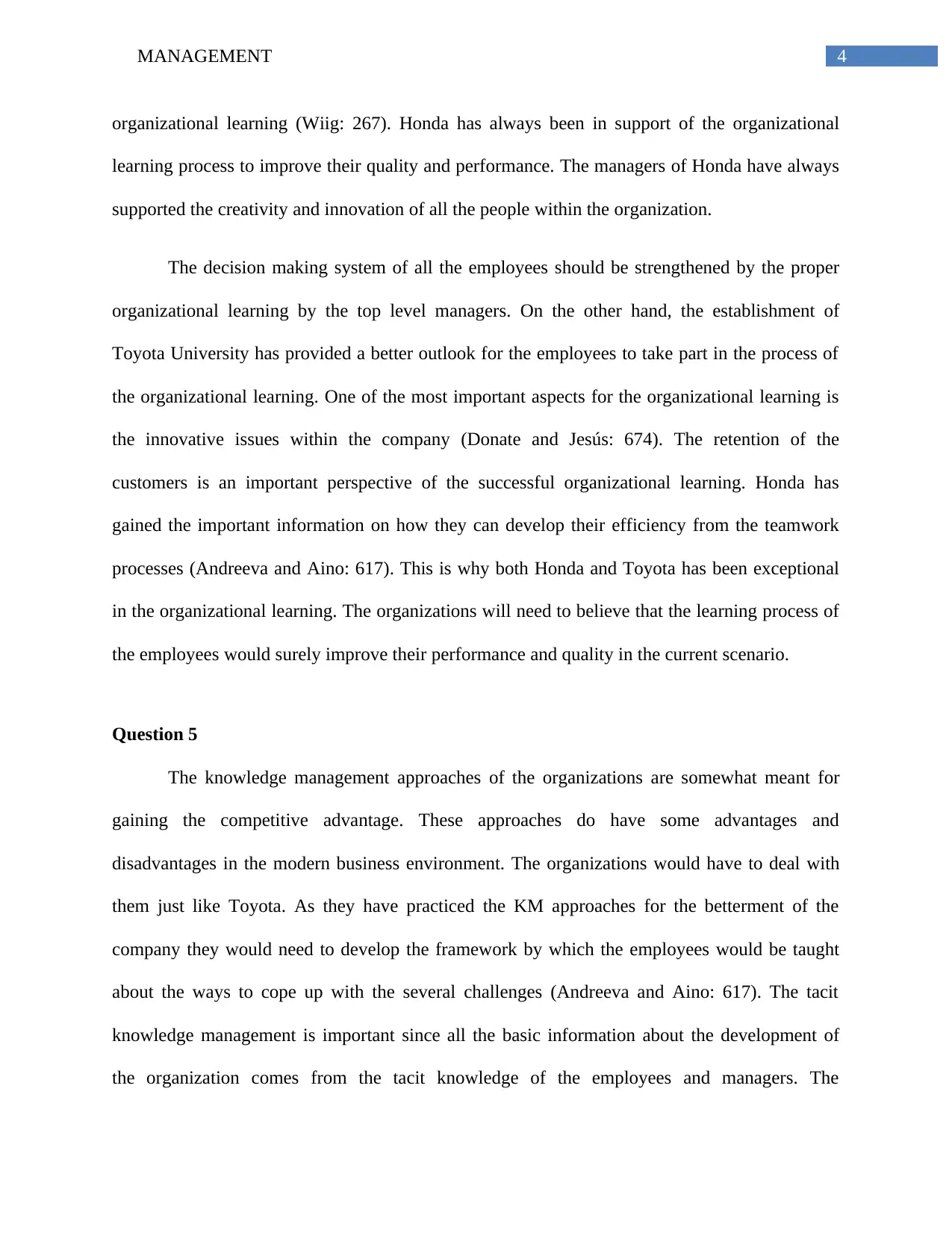
4MANAGEMENT
organizational learning (Wiig: 267). Honda has always been in support of the organizational
learning process to improve their quality and performance. The managers of Honda have always
supported the creativity and innovation of all the people within the organization.
The decision making system of all the employees should be strengthened by the proper
organizational learning by the top level managers. On the other hand, the establishment of
Toyota University has provided a better outlook for the employees to take part in the process of
the organizational learning. One of the most important aspects for the organizational learning is
the innovative issues within the company (Donate and Jesús: 674). The retention of the
customers is an important perspective of the successful organizational learning. Honda has
gained the important information on how they can develop their efficiency from the teamwork
processes (Andreeva and Aino: 617). This is why both Honda and Toyota has been exceptional
in the organizational learning. The organizations will need to believe that the learning process of
the employees would surely improve their performance and quality in the current scenario.
Question 5
The knowledge management approaches of the organizations are somewhat meant for
gaining the competitive advantage. These approaches do have some advantages and
disadvantages in the modern business environment. The organizations would have to deal with
them just like Toyota. As they have practiced the KM approaches for the betterment of the
company they would need to develop the framework by which the employees would be taught
about the ways to cope up with the several challenges (Andreeva and Aino: 617). The tacit
knowledge management is important since all the basic information about the development of
the organization comes from the tacit knowledge of the employees and managers. The
organizational learning (Wiig: 267). Honda has always been in support of the organizational
learning process to improve their quality and performance. The managers of Honda have always
supported the creativity and innovation of all the people within the organization.
The decision making system of all the employees should be strengthened by the proper
organizational learning by the top level managers. On the other hand, the establishment of
Toyota University has provided a better outlook for the employees to take part in the process of
the organizational learning. One of the most important aspects for the organizational learning is
the innovative issues within the company (Donate and Jesús: 674). The retention of the
customers is an important perspective of the successful organizational learning. Honda has
gained the important information on how they can develop their efficiency from the teamwork
processes (Andreeva and Aino: 617). This is why both Honda and Toyota has been exceptional
in the organizational learning. The organizations will need to believe that the learning process of
the employees would surely improve their performance and quality in the current scenario.
Question 5
The knowledge management approaches of the organizations are somewhat meant for
gaining the competitive advantage. These approaches do have some advantages and
disadvantages in the modern business environment. The organizations would have to deal with
them just like Toyota. As they have practiced the KM approaches for the betterment of the
company they would need to develop the framework by which the employees would be taught
about the ways to cope up with the several challenges (Andreeva and Aino: 617). The tacit
knowledge management is important since all the basic information about the development of
the organization comes from the tacit knowledge of the employees and managers. The
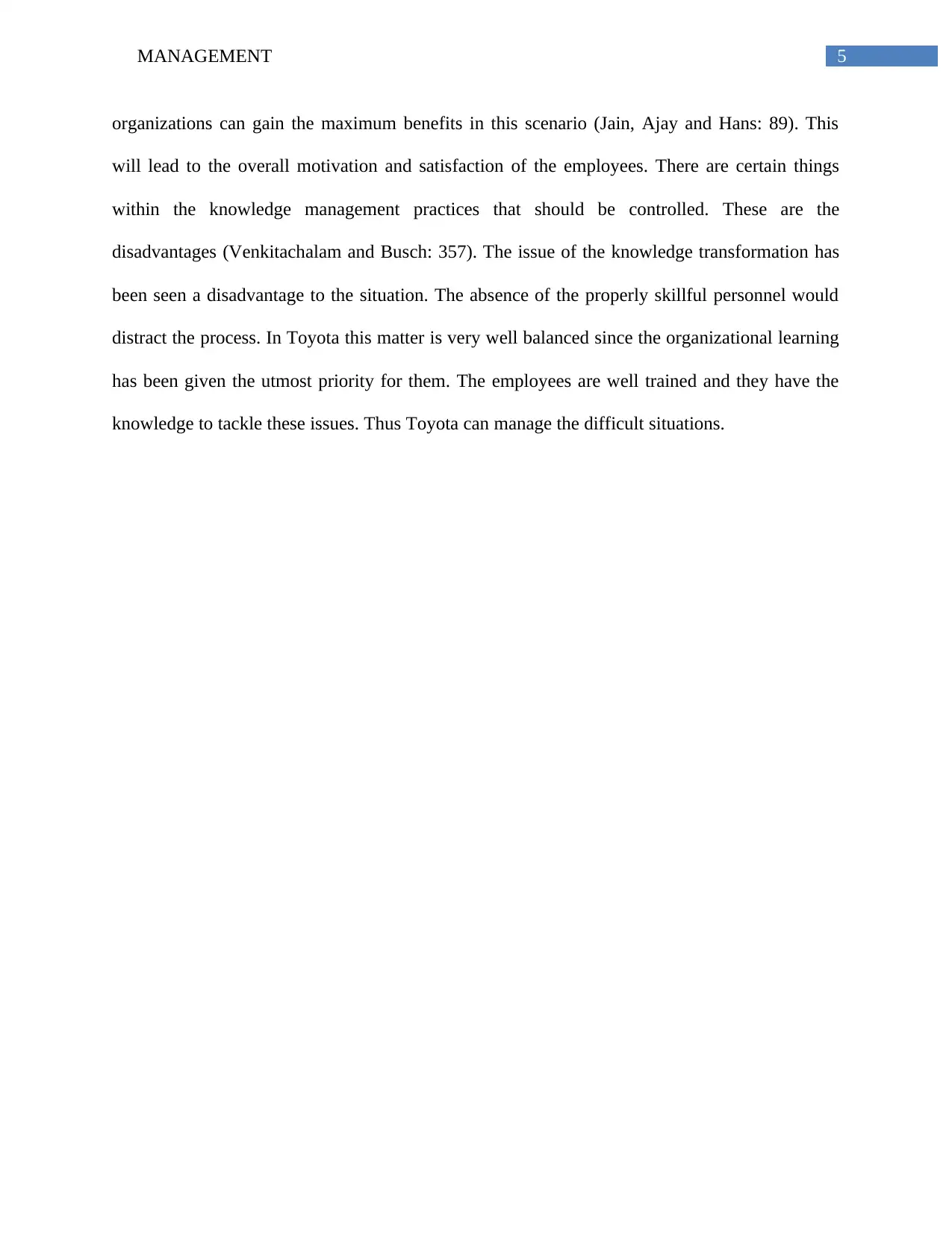
5MANAGEMENT
organizations can gain the maximum benefits in this scenario (Jain, Ajay and Hans: 89). This
will lead to the overall motivation and satisfaction of the employees. There are certain things
within the knowledge management practices that should be controlled. These are the
disadvantages (Venkitachalam and Busch: 357). The issue of the knowledge transformation has
been seen a disadvantage to the situation. The absence of the properly skillful personnel would
distract the process. In Toyota this matter is very well balanced since the organizational learning
has been given the utmost priority for them. The employees are well trained and they have the
knowledge to tackle these issues. Thus Toyota can manage the difficult situations.
organizations can gain the maximum benefits in this scenario (Jain, Ajay and Hans: 89). This
will lead to the overall motivation and satisfaction of the employees. There are certain things
within the knowledge management practices that should be controlled. These are the
disadvantages (Venkitachalam and Busch: 357). The issue of the knowledge transformation has
been seen a disadvantage to the situation. The absence of the properly skillful personnel would
distract the process. In Toyota this matter is very well balanced since the organizational learning
has been given the utmost priority for them. The employees are well trained and they have the
knowledge to tackle these issues. Thus Toyota can manage the difficult situations.
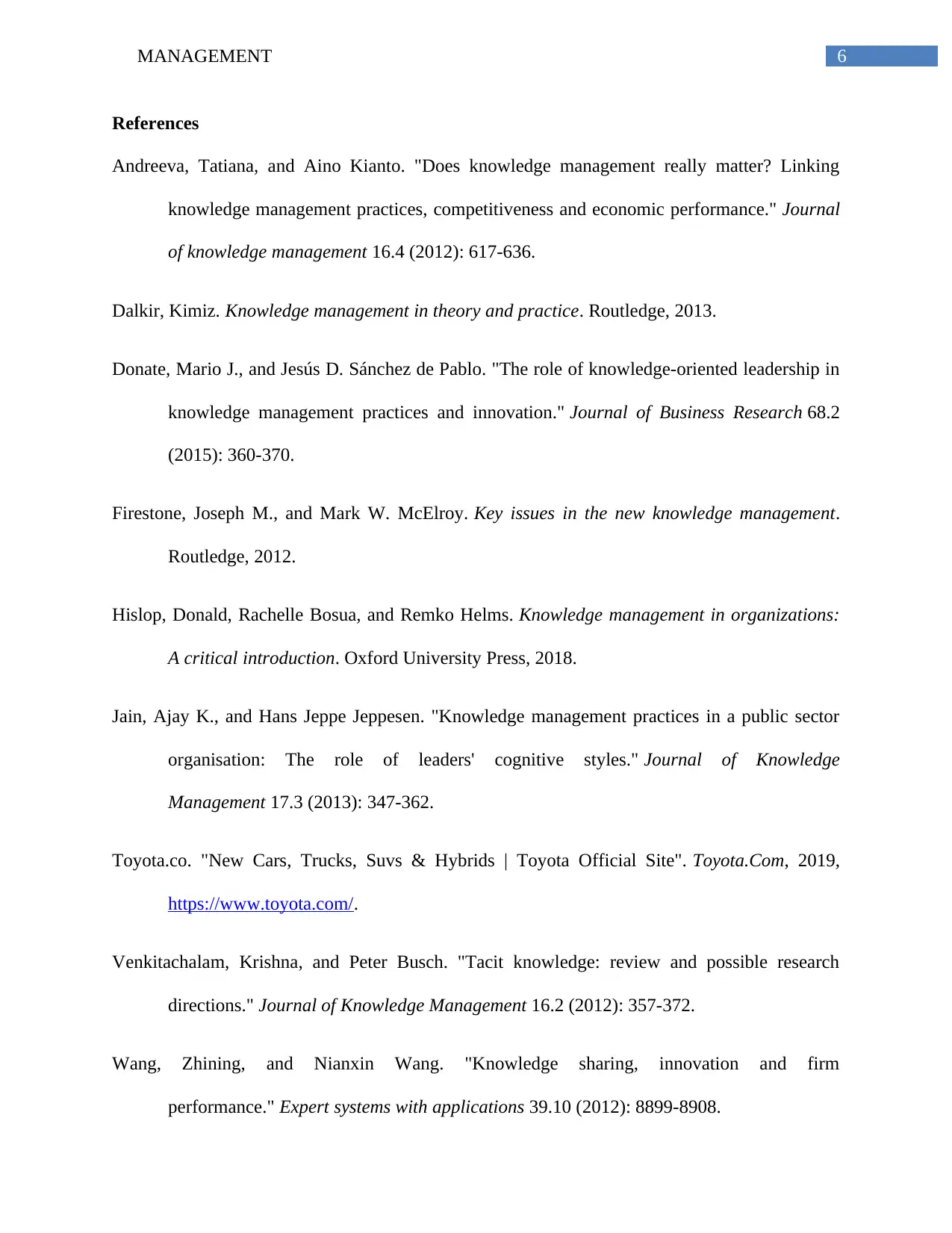
6MANAGEMENT
References
Andreeva, Tatiana, and Aino Kianto. "Does knowledge management really matter? Linking
knowledge management practices, competitiveness and economic performance." Journal
of knowledge management 16.4 (2012): 617-636.
Dalkir, Kimiz. Knowledge management in theory and practice. Routledge, 2013.
Donate, Mario J., and Jesús D. Sánchez de Pablo. "The role of knowledge-oriented leadership in
knowledge management practices and innovation." Journal of Business Research 68.2
(2015): 360-370.
Firestone, Joseph M., and Mark W. McElroy. Key issues in the new knowledge management.
Routledge, 2012.
Hislop, Donald, Rachelle Bosua, and Remko Helms. Knowledge management in organizations:
A critical introduction. Oxford University Press, 2018.
Jain, Ajay K., and Hans Jeppe Jeppesen. "Knowledge management practices in a public sector
organisation: The role of leaders' cognitive styles." Journal of Knowledge
Management 17.3 (2013): 347-362.
Toyota.co. "New Cars, Trucks, Suvs & Hybrids | Toyota Official Site". Toyota.Com, 2019,
https://www.toyota.com/.
Venkitachalam, Krishna, and Peter Busch. "Tacit knowledge: review and possible research
directions." Journal of Knowledge Management 16.2 (2012): 357-372.
Wang, Zhining, and Nianxin Wang. "Knowledge sharing, innovation and firm
performance." Expert systems with applications 39.10 (2012): 8899-8908.
References
Andreeva, Tatiana, and Aino Kianto. "Does knowledge management really matter? Linking
knowledge management practices, competitiveness and economic performance." Journal
of knowledge management 16.4 (2012): 617-636.
Dalkir, Kimiz. Knowledge management in theory and practice. Routledge, 2013.
Donate, Mario J., and Jesús D. Sánchez de Pablo. "The role of knowledge-oriented leadership in
knowledge management practices and innovation." Journal of Business Research 68.2
(2015): 360-370.
Firestone, Joseph M., and Mark W. McElroy. Key issues in the new knowledge management.
Routledge, 2012.
Hislop, Donald, Rachelle Bosua, and Remko Helms. Knowledge management in organizations:
A critical introduction. Oxford University Press, 2018.
Jain, Ajay K., and Hans Jeppe Jeppesen. "Knowledge management practices in a public sector
organisation: The role of leaders' cognitive styles." Journal of Knowledge
Management 17.3 (2013): 347-362.
Toyota.co. "New Cars, Trucks, Suvs & Hybrids | Toyota Official Site". Toyota.Com, 2019,
https://www.toyota.com/.
Venkitachalam, Krishna, and Peter Busch. "Tacit knowledge: review and possible research
directions." Journal of Knowledge Management 16.2 (2012): 357-372.
Wang, Zhining, and Nianxin Wang. "Knowledge sharing, innovation and firm
performance." Expert systems with applications 39.10 (2012): 8899-8908.
Paraphrase This Document
Need a fresh take? Get an instant paraphrase of this document with our AI Paraphraser
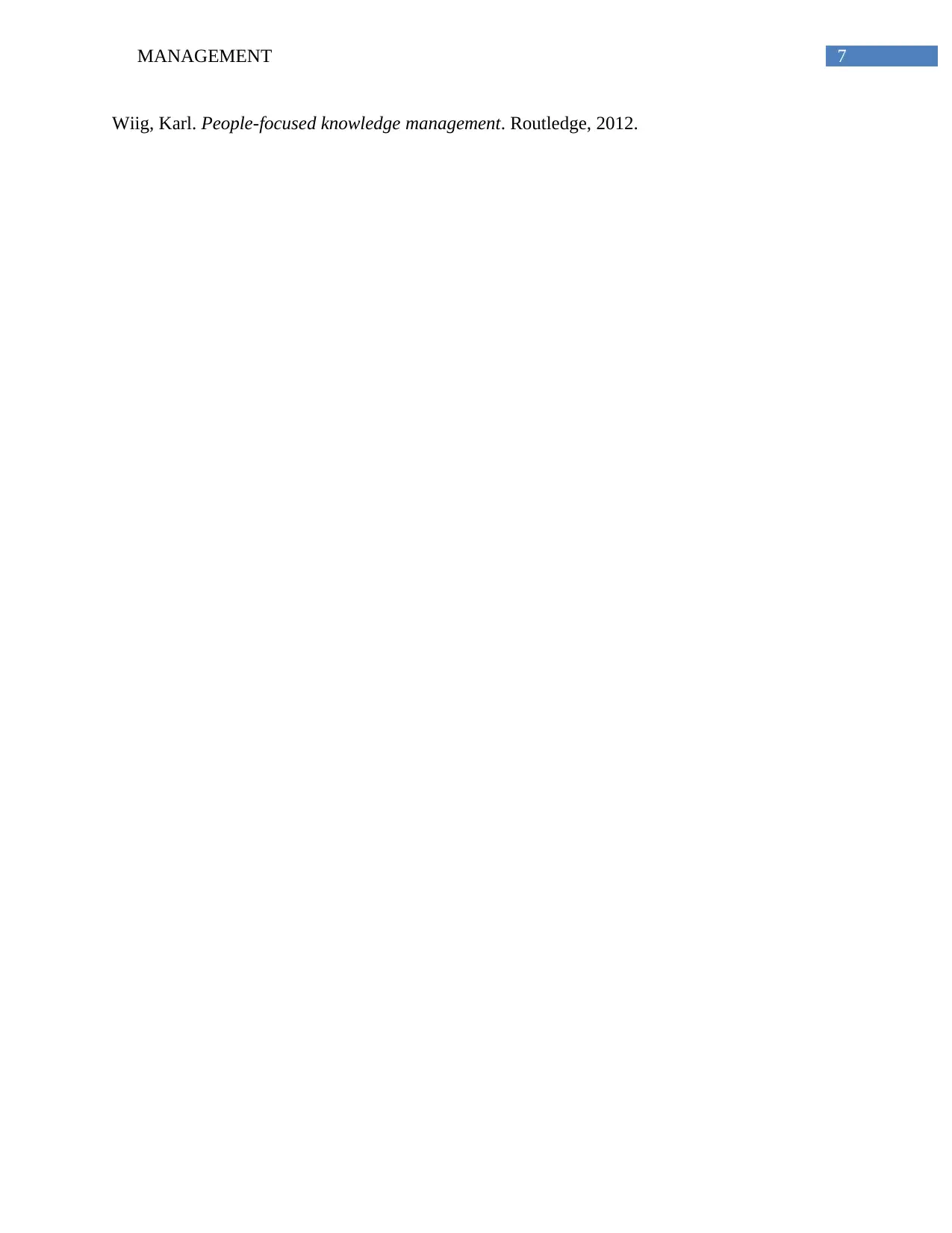
7MANAGEMENT
Wiig, Karl. People-focused knowledge management. Routledge, 2012.
Wiig, Karl. People-focused knowledge management. Routledge, 2012.
1 out of 8
Related Documents
Your All-in-One AI-Powered Toolkit for Academic Success.
+13062052269
info@desklib.com
Available 24*7 on WhatsApp / Email
![[object Object]](/_next/static/media/star-bottom.7253800d.svg)
Unlock your academic potential
© 2024 | Zucol Services PVT LTD | All rights reserved.





